
Reggae is a music genre that originated in Jamaica in the late 1960s. The term also denotes the modern popular music of Jamaica and its diaspora. A 1968 single by Toots and the Maytals, "Do the Reggay", was the first popular song to use the word reggae, effectively naming the genre and introducing it to a global audience. Reggae is rooted out from traditional Jamaican Kumina, Pukkumina, Revival Zion, Nyabinghi, and burru drumming. Jamaican reggae music evolved out of the earlier genres mento, ska and rocksteady. Reggae usually relates news, social gossip, and political commentary. It is instantly recognizable from the counterpoint between the bass and drum downbeat and the offbeat rhythm section. The immediate origins of reggae were in ska and rocksteady; from the latter, reggae took over the use of the bass as a percussion instrument.
Melvin M. Ragin, known professionally as Wah Wah Watson, was an American guitarist who was a member of the Funk Brothers, the studio band for Motown Records. He also worked extensively as a session musician in a variety of genres from jazz and pop to R&B.

Congregation is the third studio album by American alternative rock band The Afghan Whigs. It was released on January 31, 1992, by Sub Pop and followed two years of the band's touring in support of their first album for the label, Up in It (1990).
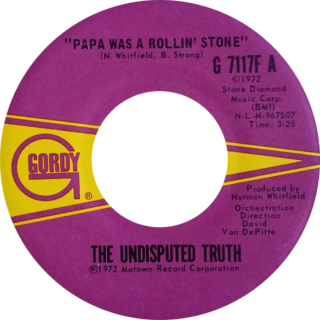
"Papa Was a Rollin' Stone" is a song originally performed by Motown recording act the Undisputed Truth in 1972, though it became much better known after a Grammy-award winning cover by the Temptations was issued later the same year. This latter version of the song became a number-one hit on the Billboard Hot 100.
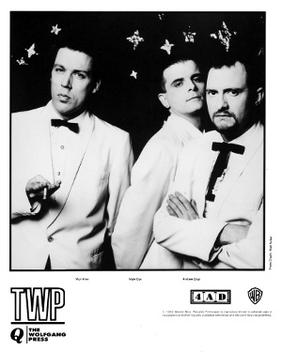
The Wolfgang Press are an English post-punk band, originally active from 1983 to 1995. The core of the band during that era was Michael Allen, Mark Cox (keyboards), and Andrew Gray (guitar). They reformed in 2024 with Stephen Gray, brother of Andrew, replacing Cox, to release a new LP titled "A 2nd Shape" on Downwards Records.
Heartbeat Records is an independent record label based in Burlington, Massachusetts. The label specializes in Jamaican music.

"Papa's Got a Brand New Bag" is a song written and recorded by James Brown. Released as a two-part single in 1965, it was Brown's first song to reach the Billboard Hot 100 Top Ten, peaking at number eight, and was a number-one R&B hit, topping the charts for eight weeks. It won Brown his first Grammy Award, for Best Rhythm & Blues Recording.

LKJ in Dub is an album by the Jamaica-born, British-based dub poet Linton Kwesi Johnson, released in 1980 on Island Records. It was produced by Dennis Bovell. It contains dub versions of tracks from the two previous LKJ albums, Forces of Victory and Bass Culture.

Harder Than You is the debut album by 24-7 Spyz. It was released in 1989 via In-Effect. The album contains elements of several genres. The group flirts with polka on "Tango Skin Polka," introspective political reggae on "Ballots Not Bullets," and speed metal with "Spill My Guts."

Dance Wicked is an album by the reggae musician Michael Rose, released in 1997 by Heartbeat Records. A dub version of the album, Dub Wicked, was released at the same time.
"Cold Sweat" is a song performed by James Brown and written with his bandleader Alfred "Pee Wee" Ellis. Brown recorded it in May 1967. An edited version of "Cold Sweat" released as a two-part single on King Records was a No. 1 R&B hit, and reached number seven on the Pop Singles chart. The complete recording, more than seven minutes long, was included on an album of the same name.
Soul Jazz Records is a British record label based in London. Outside of releasing records, the label also publishes books, occasionally films and performs as a DJ set. The music releases labels from a variety of genres, including reggae, house, hip hop, punk rock, jazz, funk, bossa nova and soul.
Post-disco is a term to describe an aftermath in popular music history circa 1979–1986, imprecisely beginning with the backlash against disco music in the United States, leading to civil unrest and a riot in Chicago known as the Disco Demolition Night on July 12, 1979, and indistinctly ending with the mainstream appearance of new wave in 1980. During its dying stage, disco displayed an increasingly electronic character that soon served as a stepping stone to new wave, old-school hip hop, Euro disco, and was succeeded by an underground club music called hi-NRG, which was its direct continuation.

Friendly as a Hand Grenade is an album by the American band Tackhead. It was released in 1989 through TVT Records.
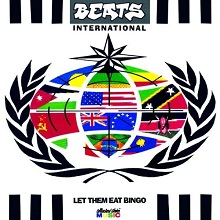
Let Them Eat Bingo is the debut album by British electronic project Beats International, released in spring 1990 on Go! Beat in the United Kingdom and Elektra in the United States. The project was founded and led by disc jockey and former Housemartins bassist Norman Cook, who produced the album alone and intended Beats International to be a collective of permanent and temporary members including singers and other performers. Cook is joined on the album by a host of contributors, including Lindy Layton, Billy Bragg, Double Trouble, and Captain Sensible.
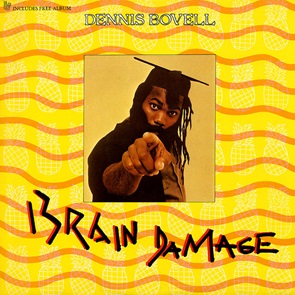
Brain Damage is the third studio album by Barbadian-British reggae musician Dennis Bovell, released in 1981 by Fontana Records. His first solo album under his own name, following two dub albums released as Blackbeard, it was Bovell's first recording at his South London-based Studio 80. Having begun to feel that reggae had not progressed as much as he would have liked, he conceived Brain Damage as an attempt to fuse the genre with numerous rhythmic styles from Europe, America, Africa and the Caribbean to highlight the genre's flexibility. The musician intended not to explore the international rhythms in a standard way but to take them to what he perceived as musical extremes. The direction was also inspired by the wide array of people in his audience.
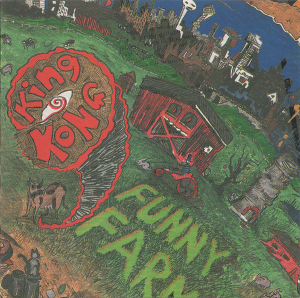
Funny Farm is an album by the American band King Kong, released in 1993. The band supported the album with a North American tour.

Too Wicked is an album by the British band Aswad, released in 1990.

Unity is an album by the British Jamaican musician Shinehead, released in 1988.














